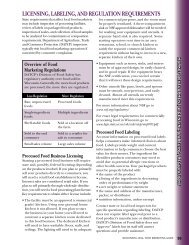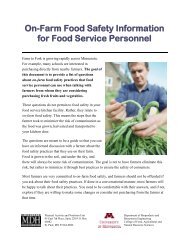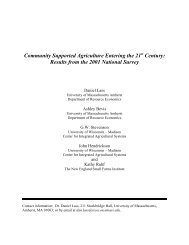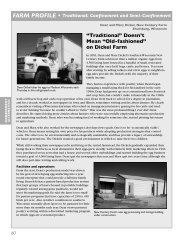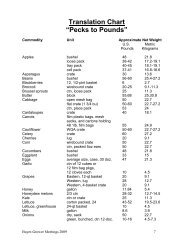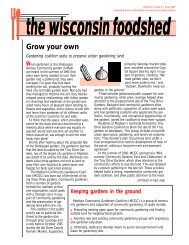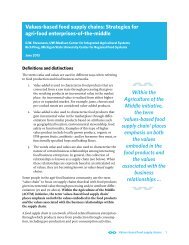Poultry Your Way - Center for Integrated Agricultural Systems ...
Poultry Your Way - Center for Integrated Agricultural Systems ...
Poultry Your Way - Center for Integrated Agricultural Systems ...
Create successful ePaper yourself
Turn your PDF publications into a flip-book with our unique Google optimized e-Paper software.
MANAGEMENT<br />
ALTERNATIVES<br />
FARM PROFILE • Traditional: Confinement and Semi-Confinement<br />
62<br />
Egg processing<br />
Old-fashion laying boxes hang from the walls, and eggs are<br />
gathered each afternoon and placed in plastic milk crates.<br />
The boxes are bedded with wood shavings, which keep eggs<br />
cleaner than straw bedding. Cleaning, sorting, and packing<br />
take place in a converted one-car garage attached to the<br />
farmhouse. Dean found a used processor <strong>for</strong> $2,000. Dean<br />
places the eggs on a conveyor chain at one end of the unit.<br />
They pass over a high-sodium light to be candled <strong>for</strong> cracks<br />
be<strong>for</strong>e going through a hot water wash. After washing, the<br />
eggs are automatically sorted by size at the other end of the<br />
processor. Mary places the eggs into cartons with a bar code<br />
and “New Century Farm” labels. Most are then packed in<br />
boxes holding 15 cartons, and placed in a cooler. Dean then<br />
loads many of the cartons into a refrigerated panel truck <strong>for</strong><br />
delivery to customers. Daily tasks normally take Dean and<br />
Mary about one-and-one-half hours to complete.<br />
Marketing<br />
“What makes this whole thing work is the sales,” Dean<br />
asserts. “I enjoy sales. If I have something I believe in, I can<br />
sell it.” About 80 percent of New Century Farm eggs are<br />
sold in Madison, Wisconsin. Restaurants buy 30 percent<br />
of the total volume, with groceries and food cooperatives<br />
accounting <strong>for</strong> most of the rest. Each Tuesday Dean spends<br />
two or three hours on the telephone with his regular<br />
customers to determine how many eggs they need. Each<br />
Thursday he makes the 90-minute drive to Madison. With 30<br />
stops throughout the city, the trip usually requires at least 12<br />
hours to complete.<br />
Until the new processing building is ready, eggs are<br />
manually candled <strong>for</strong> de<strong>for</strong>mities and sorted <strong>for</strong> size in<br />
the Dickels’ garage.<br />
The farm’s wholesale price is $2.25 per dozen. Sales have steadily increased even though in 2003 Dean raised the<br />
price 25 cents to cover rising feed costs. He said this increase was easier to make because general egg sales and<br />
wholesale prices have risen sharply, driven by the popularity of high-protein, low-carbohydrate diets. Dean also<br />
credits the relationships he has developed with store and restaurant managers, and the flexibility he is willing to<br />
offer in helping these customers balance their inventories. “They get the eggs they want, when they want them,”<br />
he explains. Dean believes that such service, along with low overhead, will keep his business competitive.<br />
The farm’s sales vary seasonally, with demand peaking during the Thanksgiving-Christmas baking season, and<br />
falling sharply during hot summer weather. The Dickels were <strong>for</strong>ced to dump eggs during the summer of 2002,<br />
but in 2003-04, more often than not, they did not produce enough eggs to meet demand. In early 2004, Dean was<br />
purchasing 25 percent of his total egg supply from an Amish group in Iowa. Although this was cost-effective, Dean<br />
was not excited about making the 300-mile round-trip to obtain these eggs. “We’ve turned the corner from being<br />
just a producer to being more of a marketer,” he said.<br />
Organic production<br />
In early 2004, Dean struggled with whether to maintain organic certification in the face of rapidly escalating feed<br />
costs, including soy meal that had reached $800 per ton. He said organic certification was important in developing<br />
his customer base, but may not be necessary to maintain that business. “Organic eggs have become a commodity,<br />
so customer service and cost are important,” Dean said. “Organic gets you in the store, but quality and freshness<br />
keeps you there.”








